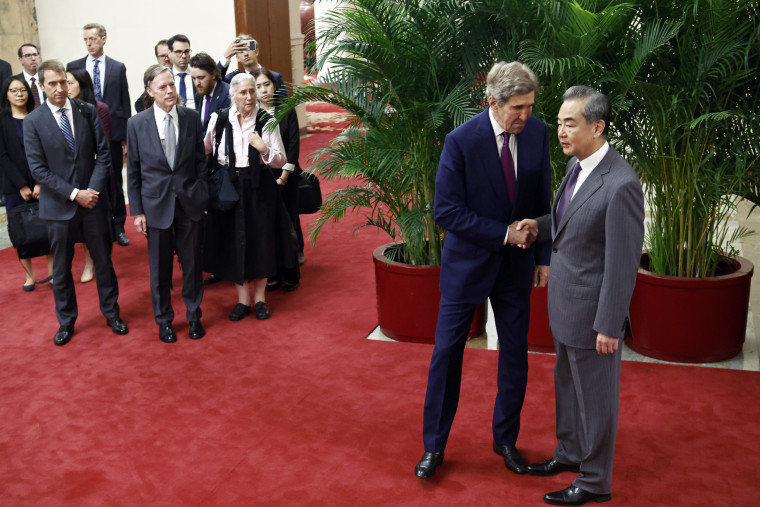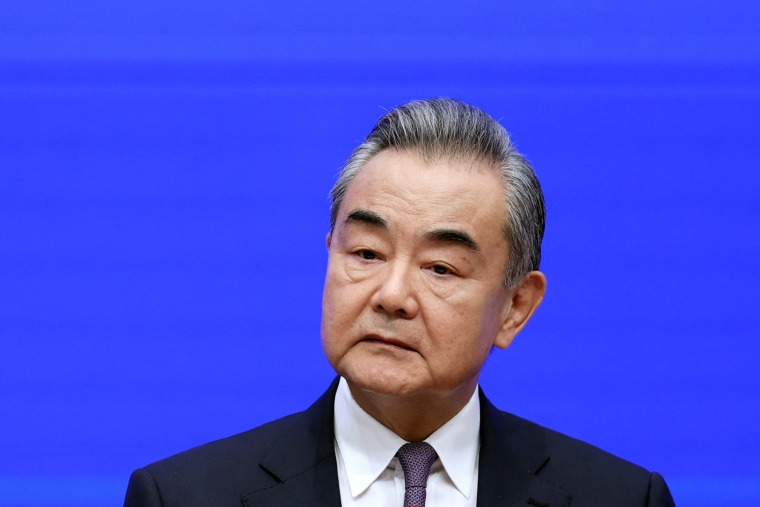WASHINGTON — Chinese Foreign Minister Wang Yi will meet with Secretary of State Antony Blinken and national security adviser Jake Sullivan during a visit to Washington this week, senior administration officials said, paving the way for President Joe Biden’s potential first meeting with Chinese President Xi Jinping in a year.
Wang’s visit from Thursday to Saturday is expected to focus largely on discussing a possible Biden-Xi meeting during the Asia-Pacific Economic Cooperation summit in San Francisco next month. The two leaders last met on the sidelines of a summit of the Group of 20 economies in Bali, Indonesia, in November and have not spoken since.
The Biden administration has not announced a meeting between Biden and Wang, but senior administration officials described the visit as “reciprocal” to Blinken’s visit to Beijing in June, when he met with Xi.
The Chinese Foreign Ministry also confirmed the dates of Wang’s visit on Tuesday.
The visit also comes as the Biden administration’s focus is on the Middle East and the threat of escalation in the Israel-Hamas war through Iranian proxies in the region. Beijing’s close relations with Tehran prompted Blinken to call Wang this month and ask China to use its influence to prevent the conflict from widening. A State Department readout of the call said Blinken discussed “maintaining stability in the region and discouraging other parties from entering the conflict.”
Relations between the world’s two largest economies have fallen to what Beijing says is their lowest point since diplomatic relations were established in 1979 over a variety of issues, including trade, technology, human rights, the status of Taiwan and China’s stance on the war in Ukraine. They were further thrown into crisis when an alleged Chinese spy balloon was shot down over U.S. territory in February, leading Blinken to postpone a planned visit to Beijing.
Over the summer the Biden administration, which says it seeks “competition, not conflict,” with China, sent a series of senior officials to Beijing to improve relations, including Blinken, Treasury Secretary Janet Yellen, U.S. climate envoy John Kerry and Commerce Secretary Gina Raimondo. Last month, Sullivan, the national security adviser, had two days of discussions with Wang in Malta.
A bipartisan group of U.S. senators visited Beijing independently this month and met with Xi for over an hour.
The lack of reciprocal visits by Chinese officials had drawn criticism from Republicans and others who want the Biden administration to take a harder line with Beijing.

China has expressed interest in a Biden-Xi meeting but has pressed for concessions, for example the easing of U.S. export controls on advanced semiconductors and other strategically important technologies.
“China believes head-of-state diplomacy is the compass and anchor of China-U.S. relations and has an irreplicable strategic role in guiding the relationship,” Liu Qing, the vice president of the China Institute of International Studies in Beijing, told NBC News last month.
“At present, China-U.S. relations are facing serious difficulties and are at a critical crossroads regarding where to go from here,” Liu said.
Last month, the Ministry of State Security, China’s top spy agency, said Washington was taking a “two-sided” approach to Beijing, accusing it of wanting to combine contact with “control.”
“To truly realize ‘from Bali to San Francisco,’ the United States needs to show enough sincerity,” the ministry said in a long post on its WeChat social media account.
Liu also said China hoped the U.S. would “demonstrate its sincerity.”
“China has principled conditions and major concerns and asks the U.S. to create the right atmosphere, remove the turbulence and create the conditions for the next high-level exchanges between the two countries,” he said.
The U.S. diplomatic outreach to China has also coincided with a period of apparent turmoil inside the Chinese government, with numerous personnel changes. During his visit to Beijing in June, Blinken had invited Qin Gang, the Chinese foreign minister at the time, for further talks in Washington. A month later, Qin was removed from his post without explanation after having disappeared from public view for weeks and was replaced by his predecessor, Wang, who was also invited to Washington.
Wang, 70, who also holds a separate post as China’s top diplomat, is the first senior Chinese official to travel to Washington since Commerce Minister Wang Wentao, who met with Raimondo in late May.
The State Department said last month that Blinken was expected to host Wang in Washington before the end of the year and that Biden hoped to meet with Xi “sometime later this fall.”
“We believe there is no substitute for one-on-one conversations at the leader level, so we will continue to work towards the possibility of that,” spokesperson Matthew Miller said.
Abigail Williams reported from Washington, Keir Simmons reported from London, and Jennifer Jett reported from Hong Kong.
CORRECTION (Oct. 23, 2023, 11:45 p.m. ET): A previous subhead on this article misstated whom Chinese Foreign Minister Wang Yi will be meeting with during his visit to Washington this week. He will meet with Secretary of State Antony Blinken, not President Joe Biden.


